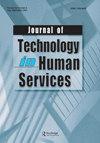“Picturephone in My Home”: Actor-Network Theory and Foucauldian Discourse Analysis on Northern Finnish Older Adults Starting to Use a Video Conferencing Service
IF 1.5
Q2 SOCIAL WORK
引用次数: 5
Abstract
Abstract Technology has been considered an important means to deliver services in a cost-effective manner in societies that are aging and implementing austerity policies. In this article, we analyze older adults’ use of assistive technology, the picturephone, in home care by combining actor-network theory (ANT) and Foucauldian discourse analysis (FDA). We also apply Foucault’s concepts of technologies of the self, regimen, and resistance. Our research materials consist of interviews with eight Northern Finnish older adults and observation data. According to our results, technological translation takes place when users associate picturephone technology with the discourses on health and safety, connectedness, and/or learning. When the technology discourse collides with or deviates from these discourses, it disrupts the technological translation, and older adults do not include the picturephone technology in their regimen, their daily life. In Finland, care policy favors technology and pursues its adoption in older adults’ care. In our case, private companies, care workers, technology advisers, family members, and older adults are recruited to join this effort. Older adults’ position in their social-material networks varies strongly in the different phases of the translation, and their technologies of the self have a significant effect on its outcome. This should be considered when designing and utilizing ICT technologies in elderly care.“我家里的图片电话”:演员网络理论和富科语篇分析——芬兰北部老年人开始使用视频会议服务
摘要技术被认为是在老龄化和实施紧缩政策的社会中以成本效益高的方式提供服务的重要手段。在这篇文章中,我们结合行动者网络理论(ANT)和傅科话语分析(FDA),分析了老年人在家庭护理中使用辅助技术,即可视电话。我们还运用了福柯关于自我、养生和抵抗的技术概念。我们的研究材料包括对八名芬兰北部老年人的采访和观察数据。根据我们的研究结果,当用户将图片电话技术与关于健康和安全、连通性和/或学习的话语联系起来时,就会发生技术翻译。当技术话语与这些话语发生冲突或偏离时,就会破坏技术翻译,老年人的养生和日常生活中也不会包括手机技术。在芬兰,护理政策倾向于技术,并寻求在老年人护理中采用技术。在我们的案例中,私营公司、护理人员、技术顾问、家庭成员和老年人都被招募加入这项工作。在翻译的不同阶段,老年人在社会物质网络中的地位差异很大,他们的自我技术对翻译结果有着重要影响。在老年护理中设计和利用信息和通信技术时应考虑到这一点。
本文章由计算机程序翻译,如有差异,请以英文原文为准。
求助全文
约1分钟内获得全文
求助全文
来源期刊

JOURNAL OF TECHNOLOGY IN HUMAN SERVICES
SOCIAL WORK-
CiteScore
4.20
自引率
6.70%
发文量
6
期刊介绍:
This peer-reviewed, refereed journal explores the potentials of computer and telecommunications technologies in mental health, developmental disability, welfare, addictions, education, and other human services. The Journal of Technology in Human Services covers the full range of technological applications, including direct service techniques. It not only provides the necessary historical perspectives on the use of computers in the human service field, but it also presents articles that will improve your technology literacy and keep you abreast of state-of-the-art developments.
 求助内容:
求助内容: 应助结果提醒方式:
应助结果提醒方式:


